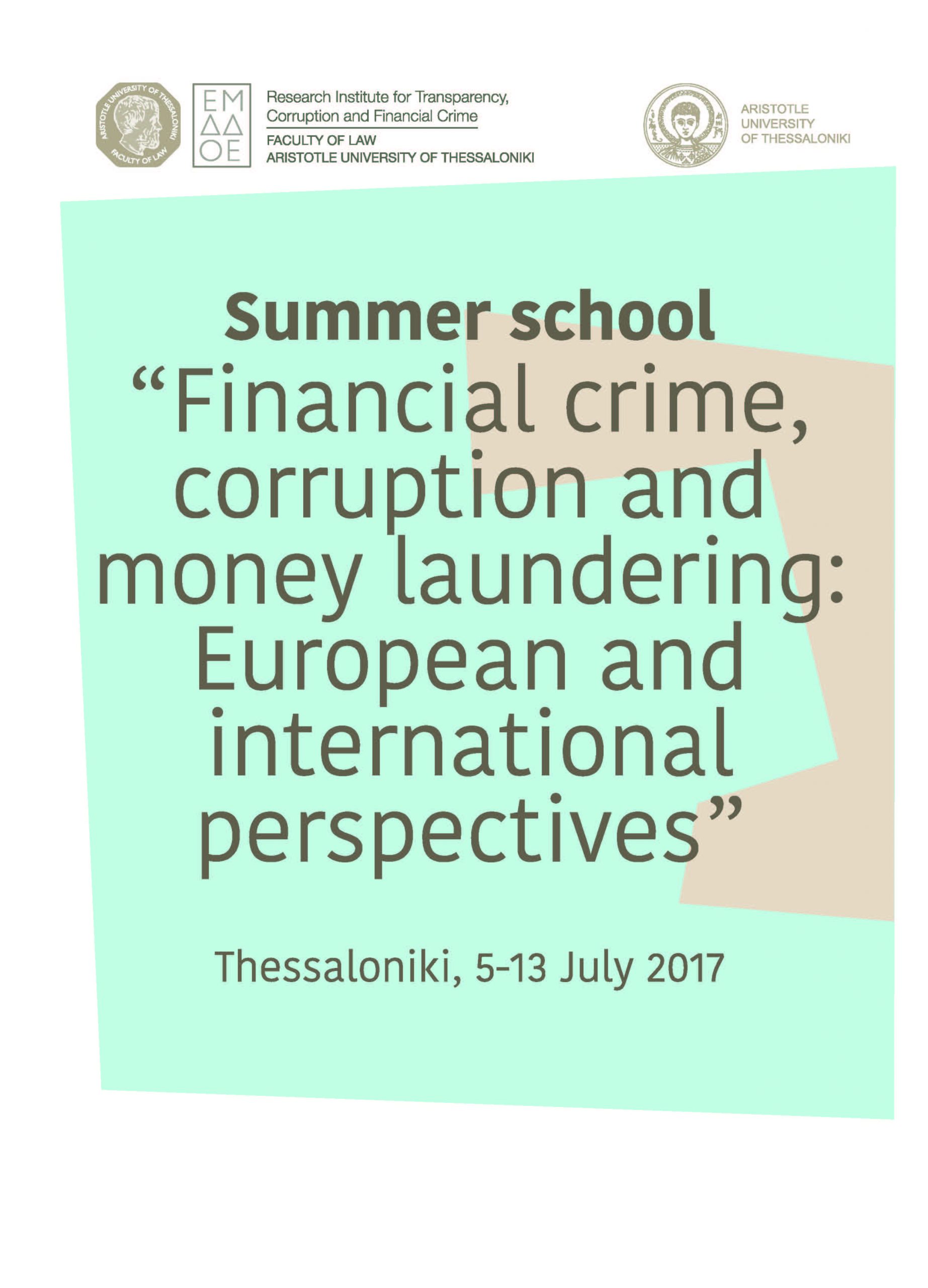The Research Institute for Transparency, Corruption and Financial Crime of the Faculty of Law – Aristotle University of Thessaloniki held its first summer school, “Financial crime, corruption and money laundering: European and international perspectives”, in Thessaloniki from 5 to 13 July 2017. Seventy nine (79) participants (students, researchers, lawyers and other professionals) from thirteen (13) countries (: Austria, Belgium, Brazil, Czech Republic, Cyprus, Germany, Greece, Italy, Lichtenstein, Netherlands, Poland, Slovenia, United Kingdom) attended the summer school’s courses, which were hosted at the Centre for International and European Economic Law and were taught in English.
The summer school’s sessions opened on Wednesday 5 July 2017. The participants were welcomed by the Institute’s Director M. Kaiafa-Gbandi, as well as the Deputy Rector of the Aristotle University of Thessaloniki, D. Klavanidou, and the Dean of the Law Faculty of the Aristotle University of Thessaloniki, G. Dellios. Distinguished Professors from different European Universities and post-doctoral researchers from the Faculty of Law of the Aristotle University of Thessaloniki taught at the summer school’s courses until 12 July 2017.
More specifically, lectures were given by the following Professors (according to the order of the programme):
- M. Kaiafa-Gbandi, Professor at the Faculty of Law of the Aristotle University of Thessaloniki (Fraud against the financial interests of the EU),
- H. Satzger, Professor at the Faculty of Law of the Ludwig-Maximilians University of Munich (Procedural and institutional aspects of combating fraud against the financial interests of the EU – the European Public Prosecutor’s Office),
- I. Zerbes, Professor at the Department of Law of the University of Bremen, (Transnational exchange of electronic evidence in matters of economic crime and corruption),
- M. Pieth, Professor at Basel University (Money laundering),
- I. Iglezakis, Assoc. Professor at the Faculty of Law of the Aristotle University of Thessaloniki (Data protection issues related to the prevention of money laundering),
- J. Walther, Assoc. Professor at the Faculty of Law of the University of Lorraine (Fighting corruption – a comparative approach of institutional and procedural aspects),
- K. Chatzikostas, Lecturer at the Faculty of Law of the Aristotle University of Thessaloniki (The United Nations Convention against corruption),
- T. Elholm, Professor at the Department of Law of the University of Southern Denmark (Perspectives on international jurisdiction concerning financial crime / Financial crime and punishment of legal persons),
- T. Papakyriakou, Ass. Professor at the Faculty of Law of the Aristotle University of Thessaloniki (Assets recovery and confiscation),
- L. Bachmaier-Winter, Professor at the Faculty of Law of Complutense University of Madrid and visiting professor at the Saint Louis University (Fighting economic crime in a transnational setting: European procedure, judicial cooperation and cross-border evidence).
Lectures were also given by the following post-doctoral researchers and members of the Institute (according to the order of the programme):
- A. Giannakoula (Criminal penalties regarding fraud against the financial interests of the EU & interventions in the general part of criminal law; EU legislation on organised crime; European Agenda on Security),
- I. Naziris (Identifying and addressing forms of financial crime carried out via the misuse of offshore companies),
- N. Chatzinikolaou (Criminal liability for self-money laundering).
Extended materials of the lectures were electronically distributed to the participants before the beginning of the sessions and at the end of every daily course. Intriguing discussions between the participants and the speakers took place throughout the classes, signifying the summer school’s well-aimed subject and high-level works. In the same direction, the participants praised the educational and organisational status of the summer school in an analytic evaluation questionnaire (indicatively, almost all of them stated that the summer school enriched their knowledge and gave them stimulation to continue their studies and that they would recommend the summer school to others).
During the final day of the summer school, Thursday 13 July 2017, the examinations took place. Afterwards, the participants were awarded their certificates, while the one with the highest score received a prize. The summer school’s sessions closed with the taking of photographs.

